 The Grapes of Wrath by John Steinbeck
The Grapes of Wrath by John SteinbeckMy rating: 5 of 5 stars
Hard to put a unique spin on such a classic book, so I'll just write some scattered observations. First of all, it's true that the book starts off slow. It's frustrating, because from the moment he appears Tom Joad is such an amazingly likeable hero that it's hard to stop following his story, as Steinbeck wants us to, in order to slow down and focus on the intermittent chapters that tell the broader dustbowl/migrant tale, as beautiful as the prose is. That having been said, it's so worth pushing on because the momentum builds up to a stunning end.
I read somewhere that TGOW with its two heroes is a perfect combination of two nineteenth century strains in American literature: the domestic feminine "Little Women" strain with Ma keeping the family together and showing a sort of womanly stalwart courage, and Tom being the Huck Finnish hero setting off to find freedom and fight the oppressive social order. Their alliance and love and understanding is an unexpectedly personal and moving part of this broad-sweeping book, and their ultimate separation all the more devastating.
As a huge fan of the Springsteen song "Ghost of Tom Joad" and a fan of literary history I knew all about Tom's climactic speech to his mom before he goes on the run, but when the moment finally came I didn't expect to burst into tears. But I did, because of the severing of this beautiful relationship Steinbeck had drawn.
The last thing I'll add is that this book sorta suffers from the same whitewashing syndrome as The Great Gatsby. People say things like "Those Joads, they just kept going through all those hard times" just as they use Gatsby's green light as, like, a great thing that all Americans should strive for! No, no, no. Our best literature pierces the rotten and greedy American heart. This book is about tough Americans during tough times, yes, but really it is the best-written, most humanistic, and masterful piece of anti-capitalist venom/ Commie agitprop I've ever read. It's incredibly timely, too, so if you're like me and you weren't assigned this in high school now's the moment to read it.
View all my reviews >>
[Now that I've read this, Catch-22 and Moby Dick the next books on my Great American novel list are:
Native Son, Brave New World and Slaughterhouse-Five.]




.jpg)





